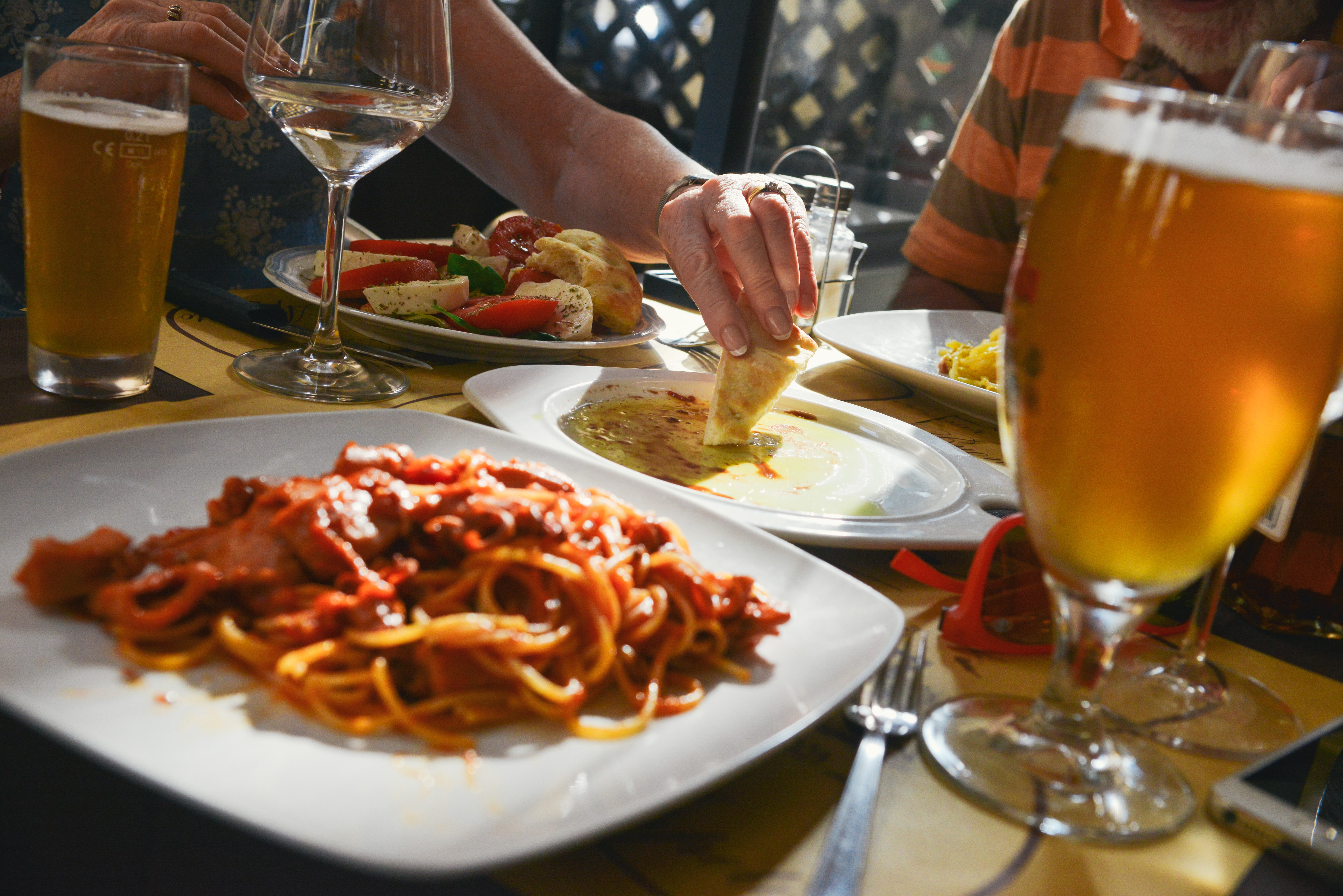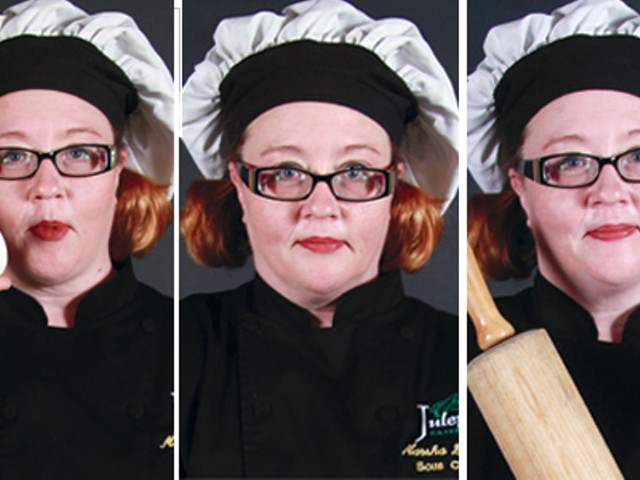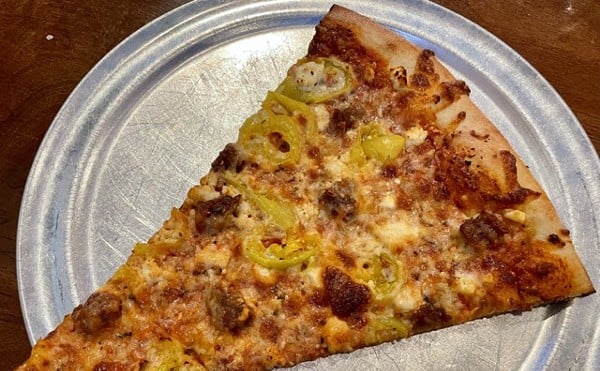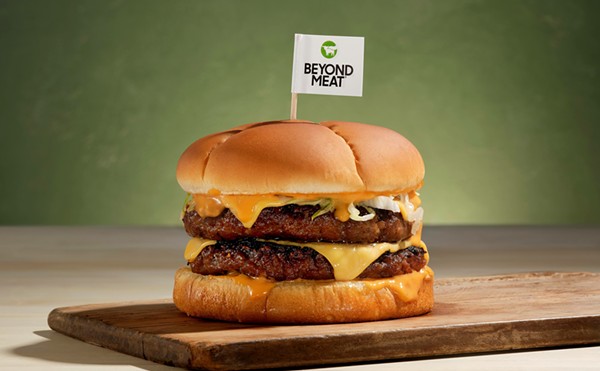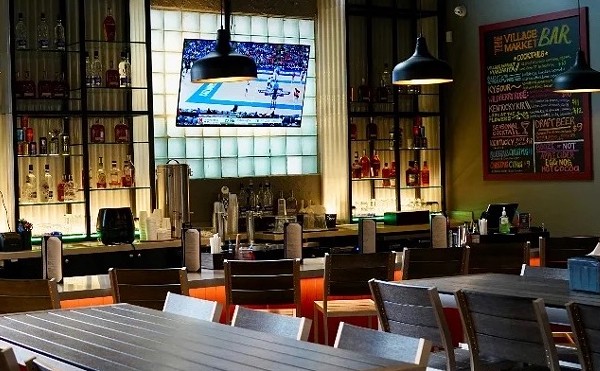When a storefront popped up on the market recently in the rapidly-developing Germantown neighborhood, St. Matthews-based entrepreneur Jack Dunaway knew he had to seize the opportunity. Though he spends his work day as owner of the boutique wealth management firm Dunaway Trust, following in his father’s footsteps, dining is his true passion. “I love dining out and I have, I think, a preternatural sense of what people in this city and this part of town want to eat,” he said. At the urging of some friends and investors, he’s ready to officially plant his flag in this burgeoning community — and the dining scene at large — with his fresh new concept, GoHo Provisions.
GoHo, a portmanteau of the restaurant’s location at Goss and Hoertz Streets, aims to provide “the Louisville dining experience in its purest concentrated form.” GoHo Provisions bills itself as “Contemporary American Fusion,” amalgamating cuisines Dunaway feels will whet the appetite of Germantown. “We’re very proud of the menu we’ve developed,” he said, adding that the biggest challenge “will be to find someone to cook it.” “Not a lot of kitchen help out there right now,” he said. “If anyone reading has any experience on the line, find us on Facebook and reach out please,” said head chef Jeff Chavez.
GoHo Provisions will feature a robust menu, with signature plates that include sorghum-infused barbecue, truffle oil fried chicken, bourbon ramen, fried chicken ramen, pizzas, a rotating “bacon inspirations” du jour selection, charcuterie and shareables. “The table setting is very important to us,” Dunaway added. “All furnishings are made with reclaimed wood from World Market.”
Each table is lit with a single Edison bulb encased in a pendant-shaped brushed-copper cage, and named after a farmer, or “agri-partner,” as the staff refers to them, who provide meats and produce for the forthcoming restaurant. "You're sitting at Charlie right now. Great local honey. You'll find it in our Saison-Tickled Rustic Chicken and Waffles."
In lieu of plates, GoHo Provisions serves most of the fare on wooden boards, including some soups. “It’s our deconstructed take on soup,” said Chef Chavez. “Nobody is serving food like this in this neighborhood," said Dunaway. "And with all the new lofts and nightlife and activity springing up here, we wanted to offer an inspired, original take on popular slow food that also reflects the fabric of this great neighborhood.”
Dunaway says he will be hosting live entertainment from Wednesday through Saturday, including DJs and live bands. “People don't go out to simply have conversations at a reasonable volume," he said. "They want in-your-face excitement and loud music, any given night of the week. Pair that with our extensive craft beer and cocktail list, and you've got the perfect date spot.” Dinner hours will be 6-8 p.m., Monday through Thursday; 6-8:30 p.m., Friday and Saturday.
Speaking of cocktails, GoHo Provisions is currently building a speakeasy in the back, La Fête. "It's French for 'The Social,' to honor Louisville's French history,” Dunaway said. The speakeasy will feature a dimly-lit ambiance and a magnificent fleur-de-lis shaped bar designed by Carter Studio. “We’re really excited about the art that’s coming in too,” he said. “We’re flying in this guy Lungfish to do some cool street-type art. He’s basically the Banksy of LA.”
As for the menu, La Fête slings artisanal cocktails such as The New Old Fashioned, a bacon-infused spin on the Louisville’s house cocktail, Jennifer’s Small Batch Sorghum Candied Bacon Julep (named after Louisville’s favorite daughter), and Bacon-Braised Jackfruit and Black Currant Bloody Marys.
He says you won't have to go up to the restaurant to grab a late night snack. "We're actually constructing this speakeasy around a food truck in the center — Jonathan & Sons’ Rolling Bistro. It’s sorta like how David Koresh's Waco compound had those school bus shelters built right in. Or… well, maybe that wasn't the best illustration."
“Really need some help with the truck, too,” said Chef Chavez. “Honestly, I’m not really even looking for experience or someone who understands mis en place or anything. Just someone eager to learn and won’t burn down the kitchen.”
Dunaway has already launched a publicity blitz with local media, giving tours to The Courier-Journal and Insider Louisville, who have already extensively covered the progress. “I’ve invested around $2.4 million in this project without a lot of runway left, so it’s important to me that the people in this community are as excited about it as I am,” he said.
GoHo Provisions aims to open by the end of the year and anticipates connecting with its clientele quickly without any major hiccups. “We’re not concerned about the dining bubble bursting in Louisville,” he said. “We’ve got the most authentic experience you can get, in the hottest neighborhood in town. GoHo Provisions is here to stay.”
“We’re already looking at a second location,” he added.
Now, let’s break it all down
Hey, that was fun. Everybody appreciates satire! Who doesn’t enjoy witnessing John Oliver eviscerate a president who likely has no idea how to add HBO to his cable package, or a delightful ol’ Doonesbury strip? Yes, none of the above is true. Yet. But as with all satire that isn’t from Andy Borowitz, the point isn’t to deceive as much as to express a truth through humor and shared experience. So if you got more than halfway through LEO’s coverage of GoHo Provisions before realizing it’s a ruse, there’s a good reason for that: This fabricated business sounds very familiar. GoHo Provisions is an absurd amalgam of any given media coverage surrounding a trendy new restaurant. To tease out the idea, I even built a website and wrote up an entire menu because, as long-time Welp! readers understand, I'm a big-time major league dumbass. A few of the jokes in both the menu and the satirical piece came from restauranteurs themselves. Mirin’s Griffin Paulin, for example, lended the observation about significant investment without proof of concept, which happens often around the monied circles. “I don’t believe in taking things too serious,” he said. “We are an ego driven bunch, and the majority of us get our feelings hurt easy. If that bothers anyone, it's only because it's true.” Other industry pals helped me workshop the voice. And of course, some of the material wrote itself, drawing on a constellation of local news stories stoking hype that may or may not have proven justified.A true story that brings it all back home
After a hefty investment renovating an antiquated Goss Avenue office building, the Germantown Craft House opened last summer. Crescent Hill Craft House, the original location, was quite successful, so surely the same concept could be replicated in the increasingly cool 40217 zip code, hedging bets that a traditionally working-class, shotgun house-laden neighborhood with a sizable starving artist population would be totally receptive to the same dining as stroller-friendly Frankfort Avenue. Who would’ve thought something couldn’t just be a carbon copy of a curated restaurant in an entirely different neighborhood and watch it take the heck off? It should be as easy as not trying to give your speakeasy some quick and easy flair by naming it after an Asian man who doesn’t exist.After a few months without much traction, the Craft House fired their staff without notice right before the holidays, closed down for a few weeks, and reopened as the Goss Avenue Pub. “We got it wrong here, and we can learn from our mistakes for sure,” GM and partner Beau Kerley told Steve Coomes on the Eat Drink Talk blog. Their retooling? “You’ll see a lot of smoked pieces, brisket and maybe pulled pork, but also some ramen bowls.” The reclaimed wood was adorned with a Bud Light neon, and it was off the races again. The problem is, of course, plenty of options — good options — for that cuisine already existed well within walking distance, save for maybe the carrot hot dog. It’s as if when things starting going south, they opened up the Yelp app, clicked the “Nearby” button, and yahoo, cursory market research with new concept in tow! Six months later, they again fired the staff and closed up shop, this time for good.
[Editor’s Note: We reached out to Kerley for a comment on the factors that led Germantown Craft House to close. He has yet to respond, but we’ll update the story if he does.]
Perhaps many in Germantown were underwhelmed by yet another burger and craft beer bistro indistinguishable from what was already established by their friends and neighbors, and maybe that’s indicative of a more pervasive frustration throughout Louisville with respect to its dining scene’s growing pains — people with the means and capital to build something who aren't a little more thoughtful or creative. How many barbecue restaurants have opened in the past year? You could throw a rock in any direction and hit a new fried chicken joint. Just because the capital is there doesn’t mean the ideas are, and that’s a bummer. Significant money was spent to create the truly beautiful aforementioned space, yet it seemed the brass didn’t spend as much time mapping out something reflective of what the neighborhood might want. Twice. On the other side of the coin, you’ll find The Post perennially packed right across the street. In part that’s because it’s really good (despite whatever that Dane Cook lookin’ Barstool Sports dipshit who should go pound sand says), but also they figured out that, beyond all logic, no one had yet opened a pizza spot — pizza — in this burgeoning neighborhood.
Addressing the problems
If there’s one thing all my service industry friends agree on, and yours too, probably, it’s that opening and running a business is extremely hard. It’s the final boss in a video game. A myriad of reasons exacerbate the struggle: surprise structural issues, a small talent pool of skilled kitchen and service help (with high turnover), fluctuating product costs and unpredictable market conditions. Having worked in the industry, and as a current small business owner, I’m completely empathetic to these challenges. But I have to wonder, given the prepossessing indoor-outdoor facade, prime real estate and the steady population growth around 1030 Goss Ave.: Would things have turned out differently if the restauranteurs took some time to read the room in Germantown and executed something that filled a much needed niche? What if entrepreneurs didn’t simply focus on the trends du jour, make guesses as to what will best cater to loft tenants who haven’t moved in yet, or rehash what’s already around? Of course, it’s commendable to fix up an unattractive building on the neighborhood’s main corridor. But how cool would it have been to do that, and then offer another good food option that embraced the community around it, rather than just flag-plant in a neighborhood rackin’ up some significant press coverage these days?For as popular as Germantown has become, and the number of quarter-million dollar condos built or slated for construction, this cool and unique part of town still lacks a lot of dining options. Neighborhood boundaries are fluid depending on who you ask, of course, but within the general geographical consensus of Germantown and Schnitzelburg, there are eight viable restaurants where one can sit down for dinner. Nine if you count your drunk ass eating Rusty's beef jerky at the Nachbar. In comparison, there are 10 on a single block of Bardstown Road between Grinstead and Highland Avenues. That doesn't even count two fast food joints and a Buffalo Wild Wings.
This is just one of many familiar stories encapsulating why I created both the fictitious restaurant and its protagonist Jack Dunaway — a carpetbagging entrepreneur capitalizing on a gentrifying neighborhood. He means well enough, but unfortunately spends more time feeding ego than thinking through how creating the “most authentic Louisville dining experience” is both cheesy and easily backfire-able, as Louisville (generally) doesn’t suffer fools. Jack’s vision presented as many cliches as possible within a single fake concept, short-staffing included. I originally hatched the idea after an experience at a chic downtown bar and grill(e) for a work function. I reached for a handful of popcorn at our table, and rather than a light and airy snack, I bit into a cluster of kernels congealed together in a glaze of chunked bacon. This was perhaps the third time in recent memory I ate surprise bacon on or in something. So thoughts and prayers for the vegetarians in this city because, like calling your fries ‘frites’ or hiring a terrifyingly loud DJ at your bar on any given night, it seems almost prerequisite to include bacon in everything, even if you’re jonesin’ for side of grateful greens. Someone along the way decided that the city’s heritage as a major pork producer means you better put some bacon in that damn shit. Barring that, bourbon or sorghum are also suitable benchmarks for localvore virtue signaling, even if it’s a bit superfluous in the dish. You, as a consumer, wanted one thing, but got another. Living in Butchertown, I’d love to see a sandwich shop nearby. Germantown friends I’ve talked with are interested in a slew of fare that isn’t just “hey, uh, Germans like meat, give ‘em a big pile of meat.” Though the sentiment takes on different shapes, it has become a common refrain for a dining scene still nascent on a national stage but gaining serious momentum in the prestige department.
How they make it work
Emily Ruff, owner of Lydia House, struck the perfect balance of realizing a unique vision and introducing something entirely new to Germantown while creating a comfortable environment and smart menu that fits well within the fabric of the neighborhood. She took over the storied, beloved original Flabby’s location, undoubtedly a challenge for a new business owner given its history. Lydia House incorporates their old signage as well as some of the building’s original trim and paint colors hidden under wood paneling. “The folks around here were pretty sad that I was not bringing back the fried chicken,” she said. “When I told them I didn’t even have fryers at all and would be serving noodles they thought I was totally crazy!” She spent time meeting neighbors “on the sidewalk or drinking across the street at the Old Hickory,” recognizing “how deeply connected people feel to this neighborhood.” Ruff realized she needed to tailor certain aspects of her vision to bolster the experience she wanted. “I knew we were doing something really different for the area, and have always been careful to train staff to be very friendly and casual, never snooty or foodie like you see sometimes in fancy coffee shops,” she said. “We have always served ‘good coffee’ and ‘cheap coffee,’ and carry as many domestics as craft beers. But being an outsider, I never realized how bizarre this place seemed to a lot of people their first time in.”Lydia House offers both create-your-own-adventure ramen bowls with fancy-pants ingredients such as pork belly, but also blue plate-style sandwiches with sides and hearty brunch options. The menu satisfies vegan and carnivore tastes, with most items clocking in around $10, served in healthy portions. And the staff earns a living wage, contributing to the sense of community around Lydia House. “I think that when people come in, at least neighbors and regulars, they can sense that we have that family vibe, and that it is open for all to join,” Ruff said. “People have always reached out to help or contribute in unimaginably kind ways. ‘Lydia House supports non-conformist culture’ has been printed on our receipts and menus since day one, without really knowing what we even meant by that,” Ruff said. “It was a calling card like ‘hey! Do you want to do something cool and different in your town? We can help!’”
While Ruff admits that the restaurant still struggles with financial stability, which is certainly not uncommon, Lydia House is here and it’s growing. It celebrated two years of business over the summer. Glowing reviews continue to pile on the hundreds that already exist throughout social media.
Sense of place isn’t as important as scratching a longstanding itch in the market for Morels Cafe, a vegan concept that creates indulgent down-home continental fare sans animal products. “There's so many people who are down with vegan junk food. It's been around for a very long time, it just hasn't been applied commercially,” said owner Stanley Chase. “The stuff we're making is creative. We’re making it up ourselves, in house, like the Farby,” he said about Morel’s vegan take on the esteemed Arby’s beef and cheddar sandwich. “I hate to call it gimmicky, but it gets butts in the door because we're speaking meat eaters' language. Something a lot of people don't want to admit is that vegans get cravings for cheesy and meaty things — some folks are uncomfortable addressing it or think they're over that. It's like the movie Blade where the elder vampires only drink synthetic blood, but they have this suppressed primal urge that comes out.”
Chase, who has practiced veganism off and on for over a decade, tapped into such a craving (with less vampirism), originally with the successful Louisville Vegan Jerky Company and now with a full extension of that idea as a brick-and-mortar in the Phoenix Hill neighborhood. “My niece is 14, and all her friends are vegetarians. The biggest thing we see is younger kids bringing their parents in because they live in The East End and don't know where to take these kids to eat. The parents are thrilled there's a place the kids wanna eat. It’s like, ‘This place is a godsend for us, because we like it too, and our kids are crazy about it.’ They can all eat there. Before [Morels], it's going to Red Robin and getting the same veggie burger over and over again.” Part of Chase’s concept includes not beating the customer over the head with the term “vegan,” leading some to not even realize they’re eating a meatless meal. “We purposefully did not plaster [vegan] everywhere. It’s up on the wall behind the counter once, and in small print on the menu.”
As far as business, Chase reinforces the idea of timing, noting the market wasn’t necessarily ready for such a restaurant at the beginning of the decade. He also echoes what practically any business owner would tell someone just graduating college: don’t immediately jump into it. But Chase also rejects traditional business school wisdom as well. “It's risky and me relying on intuition. I look at things from a consumer standpoint rather than a business owner. Like if I was coming through the door, what would I want to see? When I talk to other business owners, I try to tap into that part of their brain. What excites you? What would get you get out of bed first thing in the morning? A lot of times you have a blank piece of paper and you try to draw from inspirations, and for authenticity’s sake, that’s how I approach business rather approach it in the traditional, low-risk sort of way.”
While different executions in different neighborhoods, both Ruff and Chase share a thoughtfulness about their business, and they have been rewarded for it though some degree of success and appeal in a rapidly saturating market bolstered by tourism and the booming bourbon industry. A nod to this city’s punk rock bonafides, Louisville tends to appreciate authenticity. “It’s not just commercial shit in this neighborhood… the businesses are actually serving the community, not just selling to it,” Ruff said. Some claimed the Craft House failed because it “was too nice” for Germantown (insulting). That would certainly disregard a spot such as Eiderdown, which has become a neighborhood favorite for smart chef-driven, elevated main courses as well as a recently revamped menu of inexpensive traditional German tavern fare in a cozy, exposed-brick milieu. No, places like that don’t succeed because Louisvillians appreciate good food with a sense of its idiosyncratic history and geography, dating back to at least Wagner’s. A fun, delicious cafe that echoes the aesthetic of the neighborhood while offering distinctive dishes engenders much more excitement for Louisvillians than another lackluster cocktail bar or Bardstown Road smokeshop or menu that regurgitates trendy regional word vomit or a new downtown speakeasy ready to sue an established restauranteur because the name’s similar. While this city suffers from identity crises, one constant is that folks here like unique ideas, hospitality and the purposeful declaration of “Keep Louisville Weird.” And they can sense bullshit.
GoHo Provisions is, theoretically, the purest form of bullshit that could exist in Louisville. Entrepreneurs, investors and restauranteurs, if your concept flies a little too close to the Jack Dunaway sun of misplaced ambition, put some of those ideas back in the oven to bake a little longer. We can all agree this is a great city with a remarkable food scene — add to that in a meaningful way, rather than the safe way. The customers down the street will appreciate it.

